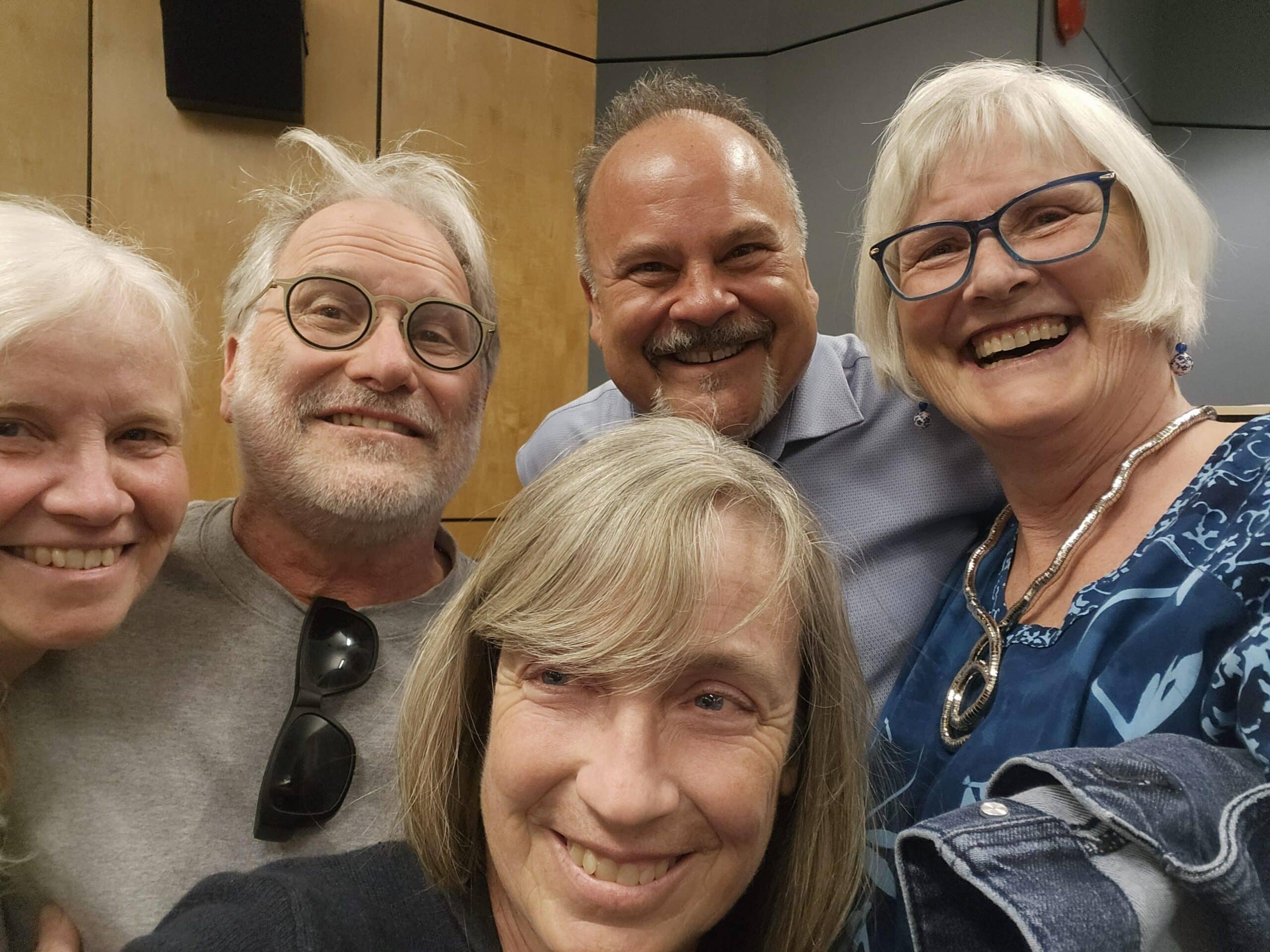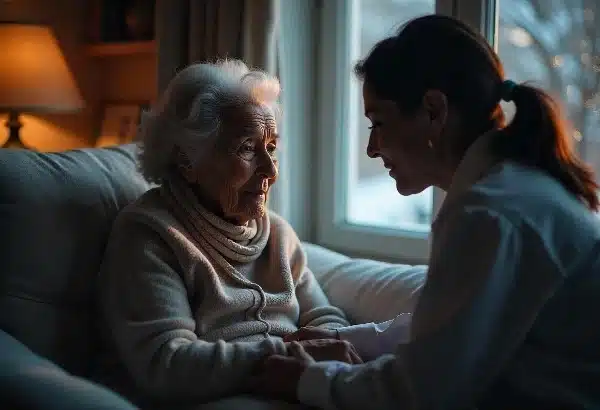This piece was written by my young friend, Lindsay Borrows. The shortened version is found in Integrating a Palliative Approach: Essentials for Personal Support Workers. – Kath
The Chippewas of Nawash Unceded First Nation is located on the eastern shore of the Saugeen (Bruce) Peninsula on Georgian Bay. We have over 2,000 band members, and about 700 live on reserve. These numbers represent our family, and we are all connected through systems of caregiving. These structures extend beyond the nuclear family and include our clan relations, adoptions and extended relatives. Part of having a large family means grief continually affects the entire community as people’s lives as members finish their journey in this life.
When tragedy such as death occurs, it is generally expected that people set aside their differences (whether political, cultural or religious) and gather together in support.
Few communities are entirely homogenous in belief and custom. Ours is no exception. Some that pass away are traditional Anishinaabe, others Christian, and most are syncretic, practicing a fusion of beliefs. Within this diversity, no two funerals are the same. There are, however, general traditions that help ensure that the deceased is not alone in their final walk home, and that the remaining family is supported as they grieve.
If someone is ill, many of the older people know how to listen to their breath and they can tell when the person only has a few days left on the earth. There are signs in nature as well, which indicate when someone is close to dying. When my great-grandpa passed away, his friend (now in his late 90s) saw four ducks circling in a pond. Then he looked up and, as if in reflection of the ducks, four birds circled overhead. He felt this was not a coincidence but was a message with important symbolism of the circle, the number four, and the birds. He immediately went home and his wife informed him that my great-grandpa had died.
So we see it is not just people involved in care giving, but we can trust nature is also there to provide comfort and closure in important ways. This is not just a human endeavour but extends to the other realms as well.
Days before the actual funeral, people gather and talk about the deceased. This is a time to honour the individual’s life, shed tears with relatives, and laugh! There is always humour as people get together and discuss memories. The older people speak Anishinaabemowin (our language), and we sing. The songs may include drumming, hymns in Anishinaabemowin or in English, or a special song that reminds people of the deceased. Sometimes the funeral is held at the community centre, other times at either the Catholic or United church on reserve. Both of these buildings are over three generations old. Sometimes a three-day wake is held at the home of the deceased. This protocol varies depending on the family and their needs.
A sacred fire is held after the person’s death, and only stops until they have been successfully sent on their journey back to the Creator and they have been buried.
The fire will often be burning for three days and young people continually keep watch. This isn’t seen as a punishment to keep the fire, but it is sacred. You enter a different dimension of time as you are engaged in that important work. You see and feel things that may not be apparent to others. People offer tobacco to the sacred fire and say a prayer when they arrive on the day of the funeral. Most consider themselves to be both a mourner and comforter as they rely on one another during these difficult times.
As people arrive at the community centre or church, they are often walking hand in hand, giving hugs, and sharing words of comfort. Even the reserve dogs sit around the building. They seem to keep watch and act as a welcoming committee of sorts. During the service people sing again, share more memories, and take one last look at the body of the deceased. They may put sweetgrass, cedar, sage or tobacco in the coffin, or pray or cry as they say goodbye. This can take over two hours depending on the number in attendance.
After the service, people follow the funeral hearse around the reserve, until it ends up at the graveyard. There will be drumming and a short prayer. As the person is buried tobacco, flowers, or other offerings gifts may be placed into the ground where the person is being buried as a sign of respect. Following the burial there is a community feast.
A plate of food is prepared for the departed soul, and placed in the sacred fire while an elder says the prayer.
People travel long distances to attend, and I usually overhear people say that we need to gather together more often, not just when someone passes on. To me this shows how positive the funerals are and even though there is great sadness, people feel good. They want to gather together more and remember how blessed we are to have life and to eventually be able to pass on in a good way.









15 Responses
Thank you for the information
What you have written is very good. Just recently, my father passed and his wish was to be cremated. As he was a devout catholic married in the Roman Catholic Church, when my mother left him 42 years ago, he did not replace her with another mate or never divorced her as he said they were married for life.
His request was to have a catholic service, majority of the family honored his wish. I must say that several of the family members practice native spirituality through the longhouse. As I being the oldest son and being close to my father, I advised all family members not to bring any longhouse drumming, singing or dancing to the funeral service of our father. Given this, they got upset at me and avoided me since the passing of my father. I got up and gave the eulogy for my father and thanked them for following through on his wishes.
After the funeral service a number of weeks ago, my fathers ashes came back and this past weekend, we had one last dinner with my father present as gatherings always made him happy. I felt the last dinner with him before we buried his ashes in the reserve cemetery.
We made the procession down to the cemetery which is a catholic cemetery and we buried him beside his parents and grandparents. When we entered the cemetery, the two longhouse members of our family said they did not want to enter the cemetery after 3 in the afternoon because they said we are not allowed into the cemetery after 3. I said to them “Why would a spirit want to hurt us? Why did they not hurt us when they were alive?” I told them if they were scared of Chi’h’s, they can wait outside the gate.
Anyway, I don’t know where they get the Do not enter a cemetery after 3 idea from. I told them that the Creator did not specify a time of death or dying, or entering a cemetery at certain times.
Let me know your thoughts on this matter.
I only lived up to my father’s last wish.
Thank you. Tomorrow, April 16th is Advance Care Planning (ACP) Day. You have identified some excellent issues to address in conversations in preparation for the day when we are sick and/or the day when we are no longer able to speak for ourselves.
It sounds like you honoured your father’s preferences for a Catholic funeral, cremation and burial of ashes. Good for you. However, it was more difficult to consider and honour the preferences and the needs of your siblings. It sounds like many of your siblings attended the funeral service, the last dinner, and joined you in or near the cemetery. Good for them.
Would it have been possible to honour your dad while including an activity or ritual that would address the needs and preferences of your siblings? For example, would it have been possible to include drumming within the Catholic service, or have the siblings participate in drumming and in a dance at the dinner?
Tomorrow, April 16th is Advance Care Planning Day in Canada. The goal of this planning process is to help identify the needs and preferences of the person who is dying, and to identify a Substitute Decision Maker who can speak on the person’s behalf if/when the person is no longer able to speak for themselves.
During the ACP conversations, it would be appropriate to discuss ways to meet the needs of the bereaved/grieving family members whose rituals and beliefs may differ from the person who is dying.
You have provided an excellent example of a need for a questions about beliefs and rituals. Others might consider asking, “How do we best meet the needs of our diverse family members after you die? How do we integrate or honour their beliefs and rituals from the longhouse with your preferences for a Catholic service?”
What do you think?
Kath
What are your beliefs on what happens after someone dies in your culture? Also thank you for the story, I understand it must not be painless to tell.
Kylie, I wonder if you are asking that question specifically to Lindsay Borrows in regards to her posting.
Wow hard call,but his wishes come first….ya can’t please everyone…❤️
Hello, in regards to First Nations culture is their a specific flower to symbolize death/mourning/grief. Or any other rituals or symbols that are done for a funeral/grave
Colonization has destroyed how we honor the passing of our loved one. I too honored my mother’s wishes to have a catholic priest presiding.
I realize the damages that the Catholic religion has done to our people and would have preferred drumming, our medicines and an elder. An offering to the sacred fire etc.
Our people who have been colonized do not know or understand this process and I see no reason not to include drumming, a sacred fire and our own ways of knowing and somehow include this to honor all relatives. There is not only one way of knowing. I wish I had done this with my mom’s passing because the COVID restrictions prevented many family members from participating in the catholic way but if we followed our own ways it would have been outside with the fires burning and use of ceremonies and feasts.
I too felt the same way, at my son’s funeral, I was asked, which funeral services I wanted. The Roman Catholic church or the indigenous way of doing funeral services. Due to the colonization process, I had lost my culture, the day school, and residential schools did that to me, along with my parents losing their culture too. I didn’t know much about the real indigenous way of having a funeral service in my culture. I told the priest I wanted the roman catholic service. When the service started, I was sitting in front of the church. I looked at my son’s casket, thinking, “my son was born into this world as an indigenous person, he belongs to this land and he deserves an indigenous style of funeral service, a long-time ago we had indigenous funeral services, smudging, and singing …other. Right away I asked my siblings if there was a person who could do that for me/us, I was very happy someone was there and available to do the smudging and singing. Today, I’m glad I did that for my son, That part of my life I have to recapture, thank you!
Victor, Thank you so much for taking some time to share your story. I am sorry to hear of the passing of your son. And hope that you and his family are experiencing much support and love as you grieve.
How important that you were able to claim your indigenous traditions, explore them, taste them, live them, and learn from them. I hope that as you “recapture” that part of yourself and your traditions, that you will be able to pull together traditions and teaching that will serve you well.
With warmth,
Kath
I recently lost my father, I was finally able to heal through the trauma and begin on the red path. Today I’m going through another loss, my 7 year old Jack Russell fur baby is dying. I’ve set up the medicine around him, prayed, sang and said my goodbyes.
He may not be human, but he will be honored with a spirit plate and a beautiful resting place.
Christine, My heart goes out to you. The loss of your father is huge, and sounds like it is also complex. And the loss of a fur-baby not only brings up past losses, but for many people is as significant a loss as any other family member. Take care, and so glad that you are able to prepare and offer a beautiful send off and resting place. Warm regards, care, Kath
I’m just wondering if anyone reading this knows how to help angry Indigenous spirits whose burial site and remains have been disturbed. I live on traditional Indigenous land, and shortly after moving here, I began to be woken up by loud knocking on my home several times a night. I’ve contacted the local Indian Band, and just learned about the disturbance of an ancient burial site nearby and apparently many people are experiencing strange occurrences ever since that happened. The problem is that the people who own the piece of land where the burial site was, refuse to put the skeletons back where they came from. I’ve tried making a food offering, but it didn’t help. The only other suggestion I’ve been given is to do a smudging ceremony, and I’ve found someone who has offered to help me with that, but she doesn’t think it will help either. I’m just wondering if anyone knows of anything else that can be done to help the spirits be at rest again.
Rochelle,
You have shared such an incredible story – one that is not totally foreign to me – in that I have heard of similar stories when graves are disturbed.
This will be posted, and we will see if there is anyone who responds.
Meanwhile, I think that asking an indigenous person from that area to be of assistance, is the best idea.
Take care.
Kath
We have so many unresolved deaths all over the world. I feel it particularly in former battlegrounds but they are everywhere. As a shamanic practitioner I am sometimes asked by people to resolve this kind of issue. The causes are numerous – a sudden death that took the spirit by surprise, a connection that is blocking their passing eg dependents or unfinished business, or fear of being judged. I work with the spirit offering the same healing opportunities as I would for a living person and helping them to release and move on. In this case though it might be better to work with someone who understands the local culture. In my view, the spirits are bothering you because they believe you can help them. You have already started that process by being aware of them and asking questions. Best wishes with your journey.